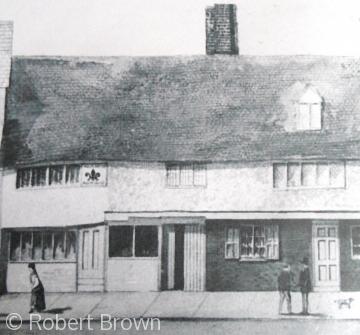William Downes, brewer of Basingstoke d. 1770

Brewing in Basingstoke in the 18th century is illustrated by the inventory of brewer William Downes, who died in 1770 leaving considerable assets detailed in an inventory sworn by his wife Ann. In his brewhouse he had 47 pounds of hops and equipment including a horse mill for grinding malt, an apple mill, and a cider press in his yard. In his storehouses he had 305 barrels of strong beer valued at £457 10s, 330 empty barrels, 29 pipes and other equipment as well as another 89 barrels and five wine pipes in a ‘sundry place’. Pipes were large barrels holding 126 gallons of wine or ale.
Downes clearly had large premises and the horse mill would have been expensive to build, maintain and operate. It was probably designed to be worked by two horses, he has five listed in his inventory. They were not really suited to the work required and would only provide a few months work at a time and would not have been capable of driving the set of millstones for crushing malt and pumping liquids around the brewery at the same time. Blind horses were often used for the repetitive work. Having his own mill suggests that Downes may have been selecting and grinding different grain to make his own mix rather than buying in ready prepared malt.
Public houses selling strong beer of a porter type (up to 4-5% alcohol), at this time were competing with the gin houses. Beer was best brewed during the colder months of the year to minimise infection of yeast. Strong beer was very suitable for storing as it contained a high proportion of sugar and being black, any unpleasant cloudiness was masked.
Downes had interests in eight public houses in the area – the Fleur de Lys, Royal Oak, Tun Tub, Shepherd and Shepherdess and Blue Anchor in Basingstoke; The Goat at Eastrop; The Wheatsheaf at Tunworth and The Rose at ‘Kersleys’, a location not identified, but a William Kersley is listed as owing rent for one of his estates. He held leases which he rented out on the Shepherd and Shepherdess, The Goat, Fleur de Lys and the Royal Oak, the latter from the Duke of Bolton. He also received rent from numerous freehold and copyhold estates. By owning an interest in the pubs the tenants were in effect tied and obliged to supply his beer which he could also protect from contamination and dilution. He also supplied his tenants with equipment and household furniture. The Fleur de Lys contained a 20 gallon copper in the brewhouse indicating a possible micro brewery.
This substantial operation must have been one of the main commercial brewing businesses in Basingstoke and outlines an 18th century specialisation with a move away from small scale production. Downes was evidently a wealthy man as can be seen from the furnishings, books and other items in his house as well as the property he owned in the area.
Content derived during research for the new VCH Hampshire volume, Basingstoke and its surroundings.


